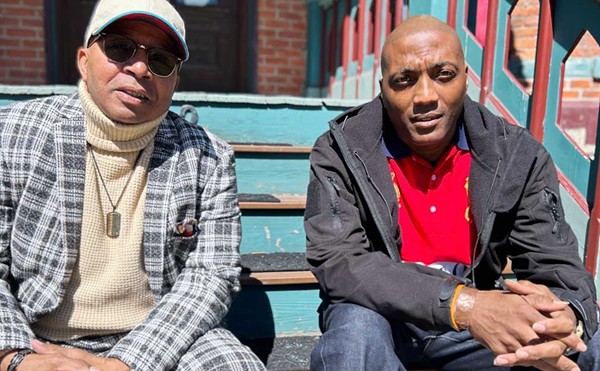The Eastern Market is a Detroit treasure, especially on summertime Saturday mornings, when teeming crowds — numbering as many as 40,000 people — descend upon the century-old marketplace. In the stores that surround the sheds, people shop the old-fashioned way, rubbing elbows and using all five senses pick out a few marbled steaks, a choice chunk or two of cheese or some freshly roasted peanuts. For lunch, Eastern Market's restaurants offer award-winning pizza, sandwiches with fresh ingredients, barbecued chicken, and many more kinds of tempting fare. For many savvy shoppers, however, those are mere frills compared to the shopping experience on offer in the sheds, where you can find dedicated local growers willing to truck in their very own produce for sale, as well as a host of specialty vendors selling hallowed rarities. One of those vendors you'll see every Saturday is Don Schneider, aka "the Mushroom Man." He has mushrooms you've never heard of, and truffles that are well worth the shocking price. He's not hard to find.
Metro Times: How did you become "the Mushroom Man"?
Don Schneider: I've been on the market for so long — I'm the fourth generation. Because I was there every day, I needed to do something to set myself apart, to make sure that I didn't have to worry about somebody coming in with 25 cases or 10 pallets of product that just destroy my opportunity to survive on the market. So I went for the most perishable stuff I could find, and mushrooms are pretty much it. I also carry it to an extreme and carry some really exotic stuff, and when I handle the stuff, I'm kind of fussy about it, sometimes giving the public too hard of a time because I want these things to get home in as fine of a condition as they can be when they look at them. So I put them in paper bags and double-bag them in plastic bags, so when you get them home you have a really good chance of taking really good care of these really perishable commodities. But I also carry a lot of other products just because my grandfather always had the best oranges, the best grapefruits. So I try to do that — even though I don't sell two pallets of them some weeks. But I always try to have the best stuff around for my customers. So I'm kind of the high-end quality. I don't think that you're going to find black truffles at most places in this city.
MT: Who was the person who started the business?
Schneider: It was my great-grandmother, my grandfather's mother. When she first came from Prussia, what is now called Russia, there was no Social Security, no safety net of any kind. You started working when you landed or you were in big trouble. I'm not sure how they ended up in Detroit. She sold nuts because you didn't have to worry about refrigeration and you could store them from week to week. Then came my grandfather who was a child when he was brought over. Imagine that! She came over first and brought part of her family and only one of my great-uncles was born in this country. Very gutsy. They came with nothing and carved out a life. My grandfather worked with his mother for all those years, then he actually was one of the original tenants in the produce terminal on Fort and Green. When my mother was a little kid, she grew up on the market, and when I was a little kid, I grew up on the market. So my earliest memories were standing on wood boxes yelling, "Lemons! Twelve for a dollar!"
MT: What about the rest of your family?
Schneider: We all grew up on the market. My sister was married to a guy who was a stockbroker and to her the market was always interesting. She worked in the advertising industry. "The market" to the advertising industry was the ad market. For her husband, "the market" was the stock market. For the rest of the family, it was the Eastern Market. It was an interesting perspective on the term "market."
MT: Are all mushrooms fungus? What is fungus, anyway?
Schneider: Yes. It has to do with how they grow. They grow from spores, not from seed. There's such a wide variety of mushrooms. Wild mushrooms are perhaps the most interesting, and they can be very, very pricey. I've been fooling around with truffles from Italy because I can't believe how reasonable they are. They're up near $220 a pound, which is pretty shocking to those of us who like mushrooms, especially since the giant white stuffing mushrooms are only $2 a pound. But truffles are some of the rarest foodstuffs on the planet. They use dogs and pigs to root 'em out. Then they dig 'em out from the roots of trees and they clean 'em and ship 'em halfway around the world. It's pretty remarkable. Some of the other wild mushrooms are nowhere near as expensive. Morels are very, very popular in Michigan. Chanterelles, I've been getting them from North Africa for the last few weeks. They literally come from all over the world. It's a fascinating business. The vast majority of them are cultivated, and the ones I pick out are mostly from eastern Pennsylvania, a huge grower. The guy's got 2.2 million square feet of growing space indoors. It's incomprehensible to me. The lower level of the warehouse is a box company that rents from him. They just make boxes for his company.
MT: There seems to be some debate about whether to wash mushrooms.
Schneider: My mushrooms have already been trimmed and cut. If you do any more processing to them, they're going to start deteriorating. You're better off going ahead and using them. They're very clean. If you buy mushrooms that have some dirt on them, you can wipe them with a damp paper towel or a toothbrush. You can wash them in water if you don't let them soak.
MT: Do you get many requests for psychedelic mushrooms?
Schneider: To me they're all magical. They help pay the mortgage!
Veal Chops Stuffed with Wild Mushrooms
from Don Schneider
4-6 tablespoons olive oil, divided
4 ounces shiitake, oyster, portobello and cremini mushrooms, cleaned, stems removed, sliced (totaling 1 pound)
1 tablespoon minced garlic
1 tablespoon chopped basil, or 1-1/2 tsp dried
1 tablespoon chopped oregano or 1-1/2 tsp dried
1 rack of veal, 7-8 ribs, cut apart, salt and pepper to taste
1/4 pound butter (optional)
3-4 sun-dried tomatoes, julienned
1 tablespoon fresh sage, or 1-1/2 tsp dried
1/2 cup heavy cream (optional)
3 quarts veal stock (optional)
2 tablespoons arrowroot or cornstarch (optional)
2 tablespoons brandy or cold water
In a large skillet heat 2 tablespoons of olive oil over medium-high heat. Sauté mushrooms 3 minutes. Add herbs, sauté another 2-3 minutes. Remove from heat, spread to cool on a baking dish or other container, or refrigerate 10 to 15 minutes.
Preheat grill if you plan to use one. Cut a 1-inch slit on the side of the chops, forming as large a pocket as possible on the inside. When filling has cooled, stuff the chops.
Preheat oven to 350 degrees. Salt and pepper both sides of chops. Press salt and pepper lightly into the meat.
If grilling, sear the chops over high heat about 3 minutes on each side. After searing, place chops on a large shallow sided baking sheet. Roast for 10 minutes in oven.
If using a skillet, work in batches if necessary. Add 1 to 2 tablespoons olive oil to large skillet. Sear on both sides until golden. Finish as if using the grilling method.
To prepare sauce: In a medium skillet, melt butter over medium heat. Add sun-dried tomatoes, sage, salt, pepper. Slowly stir in the heavy cream.
Or: Reduce stock to 1 quart; add sun-dried tomatoes and sage. Reduce further to 1/2 quart. In a small bowl, combine arrowroot or cornstarch with brandy or cold water, then stir until smooth. Add thickening mixture to veal stock and cook until thickened over medium heat, stirring constantly.
Serve veal chops with choice of sauce.
Jeff Broder interviews food folk for Metro Times. Send comments to [email protected]




